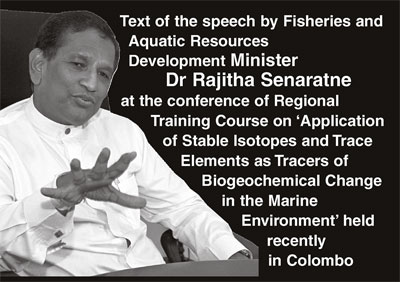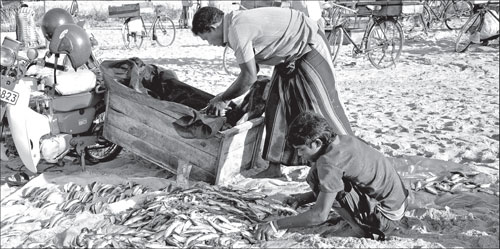Oceans are a sacred environment - Minister Senaratne
 It gives me much pleasure to address this regional programme on the
application of isotope techniques to monitor the Marine Environment. A
programme of the present nature is very relevant to an island nation
like ours, which enjoys a vast coastal belt and also an ocean area,
nearly eight times its land area, or 1/2 million square kilometres
coming under its jurisdiction or the exclusive economic zone. It gives me much pleasure to address this regional programme on the
application of isotope techniques to monitor the Marine Environment. A
programme of the present nature is very relevant to an island nation
like ours, which enjoys a vast coastal belt and also an ocean area,
nearly eight times its land area, or 1/2 million square kilometres
coming under its jurisdiction or the exclusive economic zone.
Ocean environment is very important for us Sri Lankans as we heavily
depend on seafood as a source of animal protein. Over 70 percent of our
animal protein is derived from fish. This is why my Ministry is striving
to increase our per capita consumption of fish from the present 30gm/day
to 60gm/day, within the next two years.
The total fish production which stood at 340,000 metric tons in 2009
has risen by over 100,000 metric tons by 2011 to reach a total fish
production of 445,000 metric tons. Measures are in place to increase
fish production to 590,000 metric tons by mid 2013. In this back drop, a
cleaner marine environment is as important as the land environment. We
all know water is a 'Universal Solvent'. Oceans are a sacred environment
where all life forms have begun, and one which traps sun's energy to
enrich the marine food chain. Thus it is important to treat our ocean
environment with care and respect. The Fisheries Ministry has worked
closely with the line Ministries for almost three decades to ensure the
sanctity of our oceans, especially the coastal areas. We have embarked
on a 'cleaner harbours programme' to ensure our harbours and to ensure
that their environs are kept pollution free and 'Green' through
implementing the Japanese 'Five S' concept starting with the Mirissa
harbour in the South.
Oceanic phenomena
NARA, the Research and Development arm of the Fisheries Ministry, is
also concerned about monitoring a wide range of oceanic phenomena:
renewable and non-renewable resource surveys, hydrographic and
bathymetric survey, environmental monitoring, climate change etc. In
order to facilitate research in these areas, we have embarked on an
extensive marine environment monitoring and survey programme at the
National Aquatic Resources Agency. NARA will shortly take delivery of a
special research vessel built at a cost of US $ 3 million for this
purpose. On the other hand, our efforts to increase the output of the
fishing industry will not bear fruit in the face of adverse impacts
brought about by climate change. Scientists believe that our oceanic
waters will be about 40cm higher, and also much warmer, than today by
the end of 21st century.
|

Fishermen Down South |
This will put coral reefs and sea grass beds and its associated
organisms into highly vulnerable situation, while also aggravating
several fold the current rate of sea erosion of 175,000 - 285,000 square
meters of coast per annum. According to historical records there had
been extensive sea grass beds in the Mannar Bay area of the North
Western Sea Board of Sri Lanka. Dugong, a marine mammalian, feeding on
such sea grass beds, had been living in plenty in these areas in the
eighteenth century. But they are now a rarity!.
Nuclear material
With the growing quest for energy, many nations have started looking
at the option of nuclear energy in place of fossil fuel, opening
possibilities for nuclear contamination of oceanic waters.
We still have vivid memories of what happened after the massive
Tohoku earthquake and tsunami of March 11, 2011 in Fukushima, Japan.
Though the radioactive material released to the ocean were vastly
diluted, scientists are concerned of the bio-accumulation of radioactive
contaminants like caesium-137, with a half-life over 30 years, getting
trapped in the food chain possibly causing an increased mortality in
fish and marine-mammal populations.
We all know that thousands of scientists in Japan and other parts of
the world are continuously monitoring concentrations of radionuclides in
water, sediments, plankton, molluscs, crustaceans, seaweed, fish etc in
the vicinity and waters far away to assess the health of the marine
ecosystem. Investigations involving nuclear material are costly and
requires special skills and facilities. I am happy to note that NARA is
actively cooperating in the on going programme and also in planned
activities through networking with marine scientists both within the
region and beyond. I sincerely hope the present programme will help to
further strengthen our country's ability to sustainable utilization of
our marine resources in an environment friendly manner and safeguard our
marine environment for posterity. |







